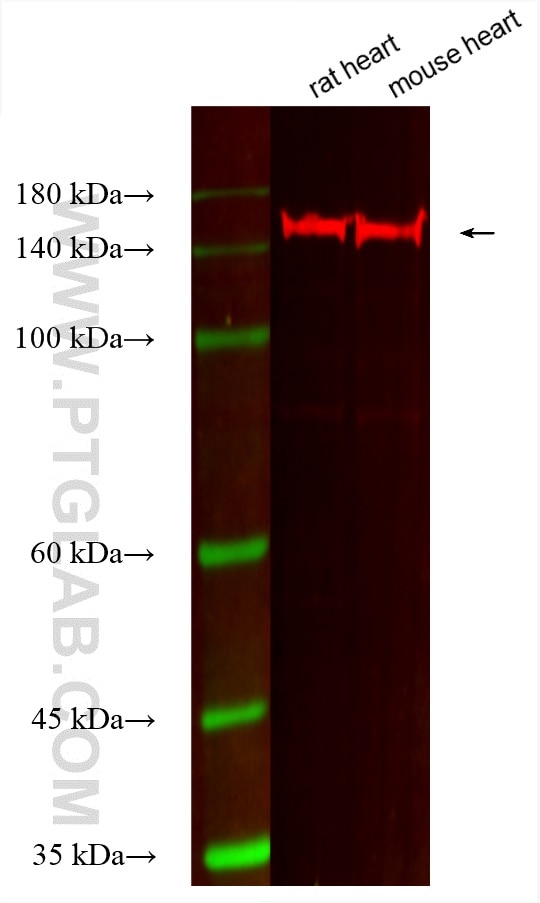MYBPC3 Monoklonaler Antikörper
MYBPC3 Monoklonal Antikörper für WB
Wirt / Isotyp
Maus / IgG1
Getestete Reaktivität
Hausschwein, human, Maus, Ratte
Anwendung
WB
Konjugation
CoraLite®594 Fluorescent Dye
CloneNo.
3C8F8
Kat-Nr. : CL594-67608
Synonyme
Geprüfte Anwendungen
| Erfolgreiche Detektion in WB | Rattenherzgewebe, Mausherzgewebe |
Empfohlene Verdünnung
| Anwendung | Verdünnung |
|---|---|
| Western Blot (WB) | WB : 1:2000-1:16000 |
| It is recommended that this reagent should be titrated in each testing system to obtain optimal results. | |
| Sample-dependent, check data in validation data gallery | |
Produktinformation
CL594-67608 bindet in WB MYBPC3 und zeigt Reaktivität mit Hausschwein, human, Maus, Ratten
| Getestete Reaktivität | Hausschwein, human, Maus, Ratte |
| Wirt / Isotyp | Maus / IgG1 |
| Klonalität | Monoklonal |
| Typ | Antikörper |
| Immunogen | MYBPC3 fusion protein Ag15848 |
| Vollständiger Name | myosin binding protein C, cardiac |
| Berechnetes Molekulargewicht | 1274 aa, 141 kDa |
| Beobachtetes Molekulargewicht | 140-150 kDa |
| GenBank-Zugangsnummer | BC151211 |
| Gene symbol | MYBPC3 |
| Gene ID (NCBI) | 4607 |
| Konjugation | CoraLite®594 Fluorescent Dye |
| Excitation/Emission maxima wavelengths | 588 nm / 604 nm |
| Form | Liquid |
| Reinigungsmethode | Protein-G-Reinigung |
| Lagerungspuffer | PBS with 50% glycerol, 0.05% Proclin300, 0.5% BSA |
| Lagerungsbedingungen | Bei -20°C lagern. Vor Licht schützen. Nach dem Versand ein Jahr stabil. Aliquotieren ist bei -20oC Lagerung nicht notwendig. 20ul Größen enthalten 0,1% BSA. |
Hintergrundinformationen
MYBPC3 belongs to the immunoglobulin superfamily and MyBP family. MYBPC3 located in the crossbridge region of vertebrate striated muscle a bands. In vitro it binds MHC, F-actin and native thin filaments, and modifies the activity of actin-activated myosin ATPase. It may modulate muscle contraction or may play a more structural role. Defects in MYBPC3 are the cause of cardiomyopathy familial hypertrophic type 4 (CMH4).
Protokolle
| PRODUKTSPEZIFISCHE PROTOKOLLE | |
|---|---|
| WB protocol for CL594 MYBPC3 antibody CL594-67608 | Protokoll herunterladen |
| STANDARD-PROTOKOLLE | |
|---|---|
| Klicken Sie hier, um unsere Standardprotokolle anzuzeigen |


